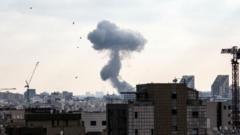Following the U.S. assault on Iranian nuclear sites, Gulf countries call for restraint yet abstain from condemning the U.S. Amid fears of Iranian retaliation and regional instability, leaders emphasize the perilous implications of escalating tensions.**
Tensions Escalate as U.S. Strikes Iran’s Nuclear Sites amid Regional Concerns**

Tensions Escalate as U.S. Strikes Iran’s Nuclear Sites amid Regional Concerns**
Gulf nations express concerns over U.S. airstrikes targeting Iran's nuclear facilities, fearing potential retaliation and broader conflict.**
On June 22, 2025, the geopolitical landscape of the Middle East became even more volatile following targeted U.S. airstrikes on three nuclear sites in Iran, an action that has drawn cautious reactions from Gulf Arab nations. While expressing deep concern over the escalation, these countries carefully avoided directly condemning the United States, their long-standing ally. Statements from leaders highlighted the delicate balance they must maintain, recognizing the potential for Iranian retaliation which could threaten their national interests.
The U.S. operations, executed under the Trump administration, were characterized as precise but also provoked a fear of wider conflict. Pentagon officials reported “severe damage” to the targeted facilities, including the heavily fortified Fordo site, yet cautioned that assessments of Iran's nuclear capabilities would take time. President Trump declared the assaults a success, urging Iran to seek peace, though uncertainty regarding a broader strategic outcome lingered.
The Iranian government’s response was marked by defiance, with officials vowing to defend their sovereignty and security. They emphasized their resolve to retaliate against any aggressions, raising alarms about the safety of U.S. military installations in the Gulf region—key targets given the dense presence of American troops and structures.
In an atmosphere charged with anxiety, Gulf nations like Saudi Arabia explicitly called for de-escalation, while Qatar diplomatically crafted a statement expressing regret over the strikes without pinpointing the U.S. as the aggressor. This reflects a cautious approach by these nations, as they weigh their reliance on U.S. military protection against the potential backlash from Iran.
Meanwhile, cities across Iran have been severely affected by the conflict, leading to civilian unrest and an exodus of families seeking safety from ongoing military actions. Iranian civilians voiced their fear and anger over the situation, describing a bleak future shaped by external hostilities and their government's hardline policies.
As the crisis unfolds, regional leaders are mindful of the potential for a protracted conflict that could destabilize their ambitions for economic diversification and regional stability. They are watching carefully, aware that the outcome may have far-reaching effects not only for Iran and the U.S. but for the entire region.
The U.S. operations, executed under the Trump administration, were characterized as precise but also provoked a fear of wider conflict. Pentagon officials reported “severe damage” to the targeted facilities, including the heavily fortified Fordo site, yet cautioned that assessments of Iran's nuclear capabilities would take time. President Trump declared the assaults a success, urging Iran to seek peace, though uncertainty regarding a broader strategic outcome lingered.
The Iranian government’s response was marked by defiance, with officials vowing to defend their sovereignty and security. They emphasized their resolve to retaliate against any aggressions, raising alarms about the safety of U.S. military installations in the Gulf region—key targets given the dense presence of American troops and structures.
In an atmosphere charged with anxiety, Gulf nations like Saudi Arabia explicitly called for de-escalation, while Qatar diplomatically crafted a statement expressing regret over the strikes without pinpointing the U.S. as the aggressor. This reflects a cautious approach by these nations, as they weigh their reliance on U.S. military protection against the potential backlash from Iran.
Meanwhile, cities across Iran have been severely affected by the conflict, leading to civilian unrest and an exodus of families seeking safety from ongoing military actions. Iranian civilians voiced their fear and anger over the situation, describing a bleak future shaped by external hostilities and their government's hardline policies.
As the crisis unfolds, regional leaders are mindful of the potential for a protracted conflict that could destabilize their ambitions for economic diversification and regional stability. They are watching carefully, aware that the outcome may have far-reaching effects not only for Iran and the U.S. but for the entire region.























